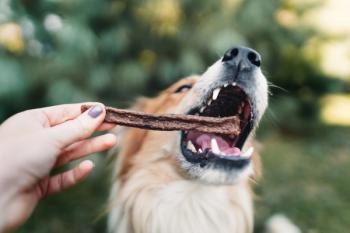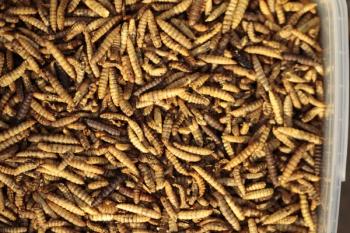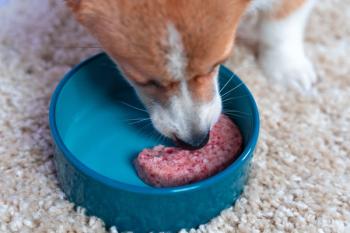
Bugs. They could be whats for dinner
Where some see a pest, others see a potential solution to a need for novel protein sources for your veterinary patients.
Give a dog a fly, and you feed him for a day. Teach a dog to use a fly swatter, and you feed him for a lifetime. (Shutterstock.com)"At our house, Sunday dinner is the only meal that we don't rush through. We take our time enjoying seconds, and even thirds, of Dad's favorite meal ... a tender and juicy roast chicken with all those great garden veggies and delicious gravy.”
Now, before your mouth starts watering or sweet memories begin filling your mind, you should know that this excerpt was pulled from a canned dog food product description. Here's how it continues:
“It's family time at its best, and in addition to great flavor, your dog will be getting the natural goodness of: delicious, protein-rich chicken, green beans, carrots and potatoes.”
Pet food descriptions like this are becoming increasingly common in conjunction with the humanization of pets. As the thinking goes, if pets are family, they should eat like family. But how sustainable is it for pets to eat the same foods we do-especially human-grade animal proteins?
This question was addressed by multiple speakers at the recent
As of 2015, the global population was over 7 billion, and according to United Nations statistics, that number is expected to increase to over 9 billion by the year 2050. And according to Euromonitor's 2017 numbers, said de Ratuld, dog and cat populations, which are currently at 289 million and 381 million, respectively, will trend upward in the coming years. Our planet's resources, however, are not projected to increase.
So when you consider that there will be more Sunday-roast-eating people and pets in competition for the same resources, the need to look for non-animal-meat proteins and palatants in pet foods emerges. One area generating a lot of buzz: insects.
Bugs may seem like a far cry from Sunday dinner, but keep in mind that much of the global human population regularly participates in entomophagy, or the consumption of insects. In fact, the Food and Agriculture Organization (FAO) of the United Nations estimates that insects are a part of the traditional diets of around 2 billion people.
Plus, there are several potential benefits to replacing beef and chicken with insects like black soldier flies, mealworms and crickets. First, according to a 2013 FAO
Still, pet foods containing insects face many hurdles to becoming the norm in the United States. For starters, according to Petfood Forum speaker David Dzanis, DVM, PhD, DACVN, Regulatory Discretion Inc. CEO, the current regulatory rubric assumes insects to be adulterants. In other words, insects are seen as food contaminants, not food. Moreover, studies remain limited on the digestibility and palatability of pet foods containing insects, though the studies that have been done demonstrated favorable results.
But perhaps one of the biggest barriers is a psychological one and goes back to the Sunday dinner: pet owners' perspectives on what pets should eat. Pet owners' own aversions to bugs could trump all of the aforementioned potential benefits, despite the fact that many pets have already willingly eaten a fly or five. And yet, the same pet owners who are likely to see their pets as family (ahem, millennials) are also highly concerned with environmental issues and sustainable food sources, so it will be interesting to see how this dinner table tension plays out.
Newsletter
From exam room tips to practice management insights, get trusted veterinary news delivered straight to your inbox—subscribe to dvm360.






